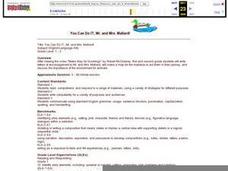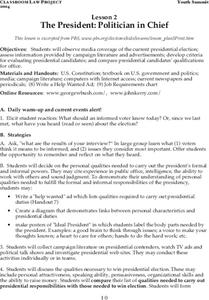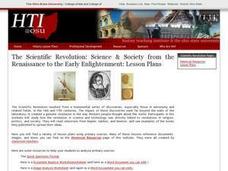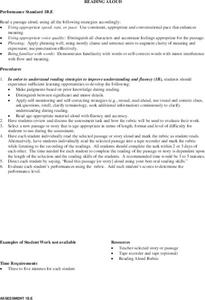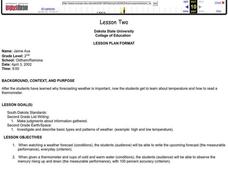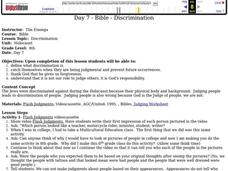Curated OER
The Underground Railroad
Middle schoolers use vocabulary related to the Underground Railroad. They identify key facts related to the Underground Railroad, evaluate their personal responses to the Underground Railroad and make a judgment about the morality of the...
Curated OER
Are We Taking Drugs that are Safe?
High schoolers compare ideas and make a value judgment about medications and their reliability.
Curated OER
Mapping the Changes
Students research an aspect of life of their choosing of a western state either before the Civil War, after the war or today. They are to write about the aspect they choose and make illustrations.
Curated OER
You Can Do It, Mr. And Mrs. Mallard!
Students watch the video "Make Way for Ducklings" by Robert Mc Closkey. They write letters to Mr. and Mrs. Mallard and make a map for the mallards. They talk about the importance of animal habitats.
Curated OER
The President: Politician in Chieft
Students explore the role of the U.S. President and the media coverage in presidential elections. They discuss what it means to be informed, the issues they consider most important, and reflect on what they learned from their interviews....
Curated OER
Passport to the Eastern Hemisphere
Seventh graders create a time line of significant dates in the history of their nation. This requires students to examine the entire history of a country and make informed judgments based on their historical knowledge.
Curated OER
Democratic Process, Constitutional Issues, Local Government
Twelfth graders engage in the decision making process so as to encourage them to become active citizens upon graduation from high school.
Curated OER
Cloud Types and Formation of Clouds
High schoolers take cloud and weather related photographs during the year, making certain to make notes of when, where and what time the photograph was taken. At some point all the pictures be gathered and a scrapbook or "cloud library"...
Curated OER
Art Criticism: Understanding Wayne Thiebaud's Salads, Sandwiches, and Desserts
Analysis consists of an understanding and interpretation of evidence and elements found in any number of expressive mediums. Upper graders critique the work of American Realist Wayne Thiebaud through a series of excellent guided...
Curated OER
Genetic Engineering
Students identify relationships between scientific concepts and their historical roots. They discuss and debate issues of ethics in science, specifically on the concept of genetic engineering and describe the processes of cloning and...
National History Day
“War Is Hell. We Know it Now.” American Soldiers in the Meuse-Argonne Offensive
Understanding the soldier's experiences during World War I sometimes takes a newscast. Learners see the importance of understanding multiple points of view with a newscast project surrounding the Meuse-Argonne Offensive. Compare and...
Curated OER
The Adventures of Tom Sawyer: Before Reading Strategy
Spark interest in Mark Twain's The Adventures of Tom Sawyer with an anticipatory exercise that begins with a brainstorm around the words heroic and good boy. Pupils then complete an anticipation guide, discuss the results in groups, and...
Curated OER
Lesson Plan 13: Going Deeper Mini-Lesson
November is NaNoWriMo, or National Novel Writing Month! If your class is participating (or simply doing a narrative writing unit), this peer review lesson is part of a larger unit which can be easily found online. Once your writers have...
Teaching Tolerance
Reflection: What’s Your FRAME?
Encourage your class to recognize the diversity in the beliefs and backgrounds of their peers. Learners use the acronym FRAME to consider culture, background, and life experiences.
Curated OER
Rating Systems
Your favorite sports team is ranked #1. How do the powers that be determine this rating? Learn how ratings are mathematically computed using probability concepts, from the Elo Rating System for chess to the Rating Percentage Index for...
Curated OER
The Scientific Revolution
Scientists participate in studying how new scientific advances have changed the world. They explain how astronomers have changed the way people view the universe, summarize the advances that were made in chemistry and medicine, and...
Curated OER
Making Inferences
Here is an excellent graphic organizer that learners use to write details and facts in boxes to the left, and inferences about them on the right. A good worksheet for visual learners!
Curated OER
You Are What You Eat: Chemical Residues and Consumers
High schoolers determine how evidence gained from a simulated test for the presence of pesticide residues can be used to determine risk. They use peas to simulate pesticide residue testing.
Curated OER
Me, Myself, and I
Students visually express their personalities using writing and PhotoShop. They manipulate imagery to illustrate their written description of themselves. Students display their creations.
Curated OER
That Is Not My Opinion!
Being an informed citizen requires distinguishing fact from opinion and understanding persuasion methods. Secondary learners evaluate newspaper editorials. They read opinion pieces, identify the writer's purpose and position on an issue,...
Curated OER
Reading Aloud
Reading aloud is a great way to engage learners in pacing and pronunciation! They practice using voice, pitch and intonation correctly. The teacher introduces the lesson by example, correctly stressing punctuation and using appropriate...
Curated OER
Golf - Lesson 8 - Course Management, Shot Selection
Every golf hole is different. Some seem so easy, while others are full of twists, turns, hills, and hazards. Learning to navigate or manage the hole is a skill worth having. This activity on course management and shot selection is part...
Curated OER
Lesson Two
Second graders, after assessing why forecasting weather is important, study about temperature and how to read a thermometer. They experiment being able to observe the mercury rising up and down when given a thermometer and cups of cold...
Curated OER
Discrimination
Seventh graders discuss the origin of discrimination and the Holocaust. In this Bible lesson, 7th graders define discrimination and discuss if they have discriminated or not. They thank God for forgiveness and realize it is no ones role...
Other popular searches
- Reading Making Judgments
- Reading, Making Judgments
- Making Judgments in Reading
- Making Judgments Activities
- Reading Making Judgments
- Making Judgments Literature
- Making Judgments From Text
- Making Judgments Primary
- Making Judgments 5th Grade





